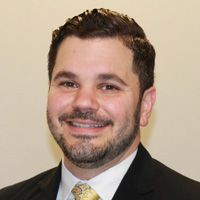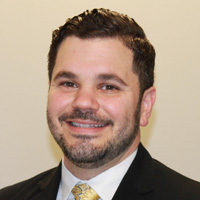5 Key Considerations as You Craft Your Retirement Plan
No retirement plan is complete without covering these five key areas.


Profit and prosper with the best of Kiplinger's advice on investing, taxes, retirement, personal finance and much more. Delivered daily. Enter your email in the box and click Sign Me Up.
You are now subscribed
Your newsletter sign-up was successful
Want to add more newsletters?

Delivered daily
Kiplinger Today
Profit and prosper with the best of Kiplinger's advice on investing, taxes, retirement, personal finance and much more delivered daily. Smart money moves start here.

Sent five days a week
Kiplinger A Step Ahead
Get practical help to make better financial decisions in your everyday life, from spending to savings on top deals.

Delivered daily
Kiplinger Closing Bell
Get today's biggest financial and investing headlines delivered to your inbox every day the U.S. stock market is open.

Sent twice a week
Kiplinger Adviser Intel
Financial pros across the country share best practices and fresh tactics to preserve and grow your wealth.

Delivered weekly
Kiplinger Tax Tips
Trim your federal and state tax bills with practical tax-planning and tax-cutting strategies.

Sent twice a week
Kiplinger Retirement Tips
Your twice-a-week guide to planning and enjoying a financially secure and richly rewarding retirement

Sent bimonthly.
Kiplinger Adviser Angle
Insights for advisers, wealth managers and other financial professionals.

Sent twice a week
Kiplinger Investing Weekly
Your twice-a-week roundup of promising stocks, funds, companies and industries you should consider, ones you should avoid, and why.

Sent weekly for six weeks
Kiplinger Invest for Retirement
Your step-by-step six-part series on how to invest for retirement, from devising a successful strategy to exactly which investments to choose.
Stashing away money for retirement is both smart and necessary to increase the odds that you will be financially secure once your working career comes to an end.
But the act of saving money is not in itself a retirement plan. You also need to be intentional in establishing how much money you will need, when and how you will spend it, how taxes might affect you, and a host of other issues.
Let’s look at five key areas you should think about as you carefully produce a retirement plan that can serve you well when you finally take that step into your post-working years.
From just $107.88 $24.99 for Kiplinger Personal Finance
Become a smarter, better informed investor. Subscribe from just $107.88 $24.99, plus get up to 4 Special Issues

Sign up for Kiplinger’s Free Newsletters
Profit and prosper with the best of expert advice on investing, taxes, retirement, personal finance and more - straight to your e-mail.
Profit and prosper with the best of expert advice - straight to your e-mail.
1. Income distribution
A top concern among retirees is running out of money, so it’s critical to take steps to make your money last. But how do you do that, especially now that the once-popular 4% rule is falling out of favor in some quarters? Dr. David Babbel, professor of finance at the Wharton School, puts it this way: “If you have a stock portfolio and withdraw a fixed amount per year, such as the standard rule of 4% plus inflation, you have a 90% chance of running out of money in retirement.”
While it would be nice to think a magic-bullet investment exists that could fix this problem, there isn’t one. That ideal investment would be safe, liquid and would show strong growth. Investments typically will do some combination of two of those, but no investment will do all three.
One of the most effective ways to make your money last is to separate your investments into different asset classes to accomplish different goals. This means that you would set aside, into income-producing vehicles, the lowest amount necessary to produce the monthly income you need above and beyond Social Security and pensions. You would also have an emergency fund of at least six to 12 months plus any known upcoming big expenses. And the rest of your money would be in a growth portfolio to hedge against inflation.
2. Tax mitigation plan
The IRS doesn’t lose interest in you when you reach retirement; in fact, a portion of your Social Security may be taxable, depending on how much other income you have. Therefore, it’s important to continue to find ways to reduce your tax bill. Instead of micro tax planning, you need macro tax planning – focusing on the big picture of what your tax-deferred accounts are going to cost you over your lifetime. Explore how each of your investments is taxed, and create a written plan for the most tax-efficient way of withdrawing money from accounts in retirement.
3. Readjusting your portfolio for retirement needs
Throughout your working years, you may have relied on an aggressive investment strategy, taking calculated risks so you could see substantial growth in your retirement savings. But as you near and enter retirement, it’s time to ease up on the risk. Your goal is no longer to grow your money but to hang on to what you have. The time has arrived to begin shifting your portfolio into more conservative investments.
This might also be a good time to reconsider which financial professional you are working with. Some advisers are more focused on accumulation – piling up as much money as possible for you – while others are more skilled at income planning – making sure that the money you accumulate lasts.
4. Health care planning
Both health care and long-term care costs can eat away at your savings. It’s especially important for retirees to know the complex ins and outs of Medicare, for which you become eligible at age 65. For example, if you don’t enroll in Medicare during your initial enrollment period, you could face premium penalties.
Also, it’s important to know that Medicare doesn’t cover everything, and one thing it doesn’t cover is long-term care. You will need another plan – savings, long-term care insurance, or other alternatives – to deal with that. Maybe you will never need long-term care, but the odds say you will. Someone who turns 65 today has a 70% chance of needing some type of long-term care services at some point in their lives.
5. Estate planning
None of us likes to dwell on this, but eventually our lives come to an end. It’s vital to have a plan in place so that the right assets get left to the right people in the right way. Perhaps surprisingly, even the wealthy and the famous fall short with this sometimes. When Prince died in 2016, it was discovered he had no valid will, and his sizable estate has been in litigation ever since.
Closer to home, I’ve seen situations where a property wasn’t titled correctly, causing problems for heirs. Tanya Bell, of Bell Law Firm, P.A., says, “Having a properly crafted estate plan can assist your family in avoiding the substantial expense of the lengthy probate or guardianship proceedings. One of the biggest problems we see at Bell Law Firm is that many people don’t ever fund their trusts.” When you fund a trust, you transfer ownership of assets from you to your trust. If that doesn’t happen, your beneficiaries will end up in probate, something you likely wanted to avoid by setting up the trust.
Certainly, creating a retirement plan that covers all the bases can be complicated, so consider conferring with a financial professional who understands the best strategies for making your money last. You don’t want all those years of investing and saving to go to waste.
Ronnie Blair contributed to this article.
The appearances in Kiplinger were obtained through a PR program. The columnist received assistance from a public relations firm in preparing this piece for submission to Kiplinger.com. Kiplinger was not compensated in any way.
Profit and prosper with the best of Kiplinger's advice on investing, taxes, retirement, personal finance and much more. Delivered daily. Enter your email in the box and click Sign Me Up.

Anthony Landi, co-founder of Sterling Bridge Financial Group, has 13 years of experience as a financial professional. As a fiduciary, he carries a legal obligation to do what’s best for clients. Landi has a Chartered Federal Employee Benefit designation, which allows him to create personalized financial strategies for clients in the Florida Retirement System.
-
 Nasdaq Leads a Rocky Risk-On Rally: Stock Market Today
Nasdaq Leads a Rocky Risk-On Rally: Stock Market TodayAnother worrying bout of late-session weakness couldn't take down the main equity indexes on Wednesday.
-
 Quiz: Do You Know How to Avoid the "Medigap Trap?"
Quiz: Do You Know How to Avoid the "Medigap Trap?"Quiz Test your basic knowledge of the "Medigap Trap" in our quick quiz.
-
 5 Top Tax-Efficient Mutual Funds for Smarter Investing
5 Top Tax-Efficient Mutual Funds for Smarter InvestingMutual funds are many things, but "tax-friendly" usually isn't one of them. These are the exceptions.
-
 Social Security Break-Even Math Is Helpful, But Don't Let It Dictate When You'll File
Social Security Break-Even Math Is Helpful, But Don't Let It Dictate When You'll FileYour Social Security break-even age tells you how long you'd need to live for delaying to pay off, but shouldn't be the sole basis for deciding when to claim.
-
 I'm an Opportunity Zone Pro: This Is How to Deliver Roth-Like Tax-Free Growth (Without Contribution Limits)
I'm an Opportunity Zone Pro: This Is How to Deliver Roth-Like Tax-Free Growth (Without Contribution Limits)Investors who combine Roth IRAs, the gold standard of tax-free savings, with qualified opportunity funds could enjoy decades of tax-free growth.
-
 One of the Most Powerful Wealth-Building Moves a Woman Can Make: A Midcareer Pivot
One of the Most Powerful Wealth-Building Moves a Woman Can Make: A Midcareer PivotIf it feels like you can't sustain what you're doing for the next 20 years, it's time for an honest look at what's draining you and what energizes you.
-
 I'm a Wealth Adviser Obsessed With Mahjong: Here Are 8 Ways It Can Teach Us How to Manage Our Money
I'm a Wealth Adviser Obsessed With Mahjong: Here Are 8 Ways It Can Teach Us How to Manage Our MoneyThis increasingly popular Chinese game can teach us not only how to help manage our money but also how important it is to connect with other people.
-
 Looking for a Financial Book That Won't Put Your Young Adult to Sleep? This One Makes 'Cents'
Looking for a Financial Book That Won't Put Your Young Adult to Sleep? This One Makes 'Cents'"Wealth Your Way" by Cosmo DeStefano offers a highly accessible guide for young adults and their parents on building wealth through simple, consistent habits.
-
 Global Uncertainty Has Investors Running Scared: This Is How Advisers Can Reassure Them
Global Uncertainty Has Investors Running Scared: This Is How Advisers Can Reassure ThemHow can advisers reassure clients nervous about their plans in an increasingly complex and rapidly changing world? This conversational framework provides the key.
-
 I'm a Real Estate Investing Pro: This Is How to Use 1031 Exchanges to Scale Up Your Real Estate Empire
I'm a Real Estate Investing Pro: This Is How to Use 1031 Exchanges to Scale Up Your Real Estate EmpireSmall rental properties can be excellent investments, but you can use 1031 exchanges to transition to commercial real estate for bigger wealth-building.
-
 Should You Jump on the Roth Conversion Bandwagon? A Financial Adviser Weighs In
Should You Jump on the Roth Conversion Bandwagon? A Financial Adviser Weighs InRoth conversions are all the rage, but what works well for one household can cause financial strain for another. This is what you should consider before moving ahead.